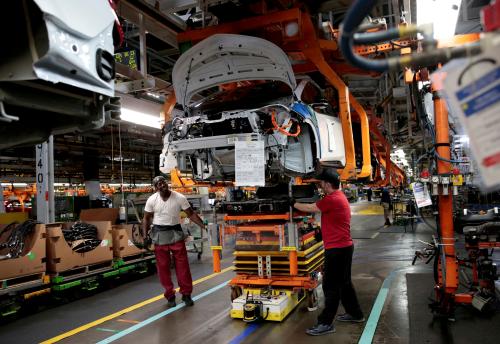- Metropolitan areas in the United States, Canada, and Mexico contain 77 percent of the three countries’ total population but generate 86 percent of their combined GDP. These 432 metropolitan areas with populations of at least 100,000 generate even higher shares of national and continental output in key advanced manufacturing sectors—aerospace, automotive, electronics, machinery, pharmaceuticals, and precision instruments.
- U.S. metropolitan areas traded $512 billion in goods with Canadian and Mexican metropolitan areas in 2010. This total represented a majority (58 percent) of the $885 billion in goods traded between the United States and Canada/Mexico. Twenty-five U.S.-Canada metro pairs, led by New York and Toronto ($3.7 billion), and 15 U.S.-Mexico metro pairs, led by Los Angeles and Mexico City ($2.2 billion), each traded more than $1 billion in goods in 2010.
- Advanced industries—aerospace, automotive, electronics, machinery, pharmaceuticals, and precision instruments—account for 47 percent of goods trade in North America, and metro areas account for 69 percent of trade in advanced industries. For the most technologically advanced goods, including aerospace, electronics, and pharmaceuticals, at least 75 percent of North American trade occurs among metro areas. More than three-quarters of advanced-industries trade with Mexican and Canadian metro areas originates or terminates in non-border U.S. metro areas.
- Goods trade in key advanced industries binds distinct sets of metropolitan areas across North America. The top 20 North American metro areas for automotive, electronics, and aerospace trade account for 15 percent, 18 percent, and 40 percent, respectively, of total trade between the United States and Canada/Mexico in those commodities. The largest trading relationships involve Detroit and Toronto in automotive, San Jose and Mexico City in electronics, and Seattle and Montreal in aerospace.

Business & Workforce
Rebuilding America’s economy and foreign policy with ‘ally-shoring’



